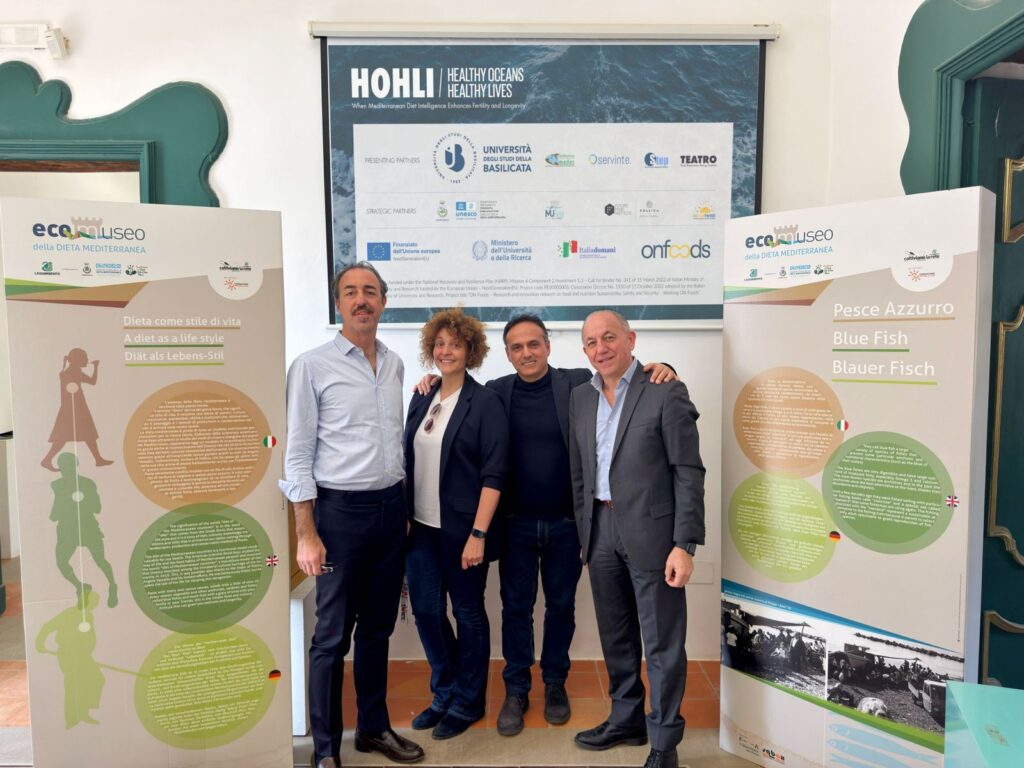The University of Basilicata presents jointly with the Municipality of Pollica a pioneering initiative exploring the nexus between human health, fertility, ocean ecosystems and the Mediterranean Diet.
Pollica, March 23, 2025 – The HOHLI – Healthy Oceans, Healthy Lives project was officially presented at the Museo Vivo del Mare, in Pioppi. This pioneering initiative, born in the heart of the Cilento Geopark, brings together the University of Basilicata, the MEDES Foundation, Teatro S.r.l., Step S.r.l., and Servinte S.r.l., along with strategic partners such as Eco Food Fertility, the Paideia Campus of the Future Food Institute, the Municipality of Pollica, e Museo Vivo del Mare. Its ambitious goal is to explore the nexus between human health, fertility, the quality of marine ecosystems, and the Mediterranean Diet.
A Cutting-Edge Project for Oceans and Human Health
HOHLI aims to investigate and highlight the role of local seafood products and the marine environment in promoting longevity and fertility, through the One Health approach. The pilot areas include Cilento and the Adriatic coast, where environmental, clinical, and behavioral data will be collected and integrated across various age groups. The project is rooted in the value of the Mediterranean Diet and the quality of local fish, as levers for individual and collective well-being.
Using environmental sensors, clinical tests, and predictive algorithms, HOHLI will develop an intelligent digital platform offering concrete tools to guide public health policies and strengthen ecological, nutritional, and health resilience.
“Reproductive biomarkers, central to a One Health approach, are early and sensitive indicators not only of environmental health—as we have long demonstrated with EcoFoodFertility—but also of overall health and life expectancy. A recent article published in Human Reproduction confirmed that good semen quality is correlated with longevity. With HOHLI, we want to explore how integrating biomolecular data with nutritional and environmental data—such as the Mediterranean Diet and coastal environment—could play a key role in prevention, reproductive health promotion, and healthy aging,” stated Dr. Luigi Montano.
“We are proud that Pollica continues to be at the center of scientific and cultural innovation, proving that the Mediterranean Diet is a living and evolving heritage,” declared Stefano Pisani, Sindaco di Pollica. “With HOHLI, we are once again investing in knowledge to ensure a healthier and more sustainable future for our communities and our planet.”
Prof. Giovanni Quaranta, Professor of Agricultural and Food Economics and Policy at the University of Basilicata and Scientific Director of the HOHLI project, added: “With the HOHLI project, we aim to build a new alliance between human health, environmental quality, and food sustainability, starting from the extraordinary richness of the Mediterranean heritage. We will work with an interdisciplinary approach to study how local seafood, integrated into conscious and healthy lifestyles, can promote fertility and longevity. This project is both a scientific and a cultural and social challenge: an invitation to rediscover the deep connections between what we eat, the environment around us, and our future well-being.”
“The HOHLI project perfectly embodies the vision of the Future Food Institute: to promote ecological regeneration through food, recognizing it as a catalyst for health, well-being, and resilience—for people and the planet. In this journey, the sea and the Mediterranean Diet represent two inseparable and extraordinarily powerful elements,” said Sara Roversi, President of the Future Food Institute and Founder of the Paideia Campus.
“With HOHLI, we want to demonstrate that ocean health is intimately connected to human’s. By promoting awareness and traceability of local seafood, we enhance biodiversity, food quality, and the cultural legacies that have preserved this knowledge for centuries. Our goal is to generate knowledge, tools, and policies that transform the Dieta Mediterranea into a concrete strategy for ensuring fertility, longevity, and prosperity, setting an example for coastal communities around the world. In doing so, we aspire to make sustainability a daily, shared, and global choice,” Roversi concluded.
HOHLI is developed within the research activities of Spoke 5 “Lifelong Nutrition”, part of the extended partnership program ONFOODS – Research and Innovation Network on Food and Nutrition Sustainability, Safety and Security, funded by the PNRR – Mission 4, Component 2, and supported by the European Union – NextGenerationEU.
Press Contacts:
University of Basilicata – Prof. Giovanni Quaranta: giovanni.quaranta@unibas.it
Future Food Institute – Communications Office: press@futurefoodinstitute.org

